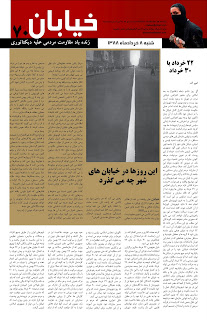 Translation of latest Khiaban newspaper lead article.
Translation of latest Khiaban newspaper lead article. June 12th or June 20th?
by Amir K.
Khiaban #70 / Saturday, May 29, 2010
Since the Ashura protests on December 27 [2009], no opportunity for oppositional presence of the people on the streets of Tehran has been produced. Although large numbers of citizens poured onto the streets on February 11, 2010 [anniversary of the revolution], the regime was in effect able to hold complete control over the streets. From that time on, the only important oppositional arena was the general strike in Kurdistan in protest to the execution of five [Kurdish] political prisoners by the regime in May [on May 9, 2010]. Although people's fury has been piled high, lack of a particular plan in the movement, lack of a strategy, and the fact that people's independent organizations have only just been formed, and all of this alongside a brutal police and security crackdown -- these factors have all combined to take the society out of the streets and hand the streets back to the bloodied hands of the Islamic Republic.
It is for these reasons that June [anniversary of the fraudulent elections and the movement that rose up in its aftermath] finds a distinct significance in determining the fate of the current stage of the people's movement. If the regime is able to control this month, in effect another stage of the Iranian people's struggle for achieving a just and free society will have ended without any objective gains. Both the citizens and the state are well aware of this. The "Green industry" is trying to bring people to the streets to protest on June 12. However, since it lacks any party organization or infrastructure, its preference is to expend this effort at the ordinary citizens' expense, hoping that perhaps some benefits might be thereafter bestowed on 'special' citizens. It has been said that, "If a permit is issued," there will be a march on that day. We know that no permits will be issued. Those who make such statements also know this. However, the main reason for saying these things is to turn June 12 [anniversary of the elections] into a goal for the society, so that self-initiated and independent oppositional groups and associations, much as they have pushed forth their struggle with their own ingenuity since the start of the movement, this time too, if conditions and capabilities permit, unify their street protests on this day and create a new wave on the streets.
However, should we observe June 12 as the anniversary of the new movement and make our move on that day? Or, can June 20 be a more appropriate day for unifying our organizational efforts and innovations as well as different circles of citizens, for a street unity in the city and in opposition to the Islamic Republic? Since it has been preordained that this time too the citizens take things into their own hands, and since no nationwide organization or party exists to organize such a huge demonstration, it is natural that it is the collective wisdom which must, through a speedy discussion and reasoning, make a decision, determine a goal and then act. It is along these lines that two reasons will be presented for targeting June 20 instead of June 12 [for a day of action].
The conceptual reason: June 12 is the anniversary of the elections. On the next day, June 13 [last year], Ahmadinejad was announced the winner of the elections. During the following week, people took to the streets to express their protests against the announced results. On June 19, in his Friday prayer speech Khamenei threatened the dissidents with death. Despite that, most honorable people willing to give all came out onto the streets courageously. Bullets shot straight at demonstrators started to rain, and tens of citizens including Neda Agha-Soltan fell and soaked in their own blood, to become witnesses to the tyranny and blood letting of this regime. The initial protest against the disappearance of votes [soon] found itself faced with a regime that in order to save its rule had no qualms about killing people. All its legal organs and institutions -- from the Supreme Leader, to the Guardian Council, the Islamic majlis [parliament], the police and the Revolutionary Guards, and on -- are standing against the people's demands and murder them ruthlessly. Protesting on June 12 can at best represent and signify a demand for holding new elections, a demand that even Moussavi and Karroubi have yielded on. However, protesting on June 20 signifies a vaster meaning. It is the day of the opposition and protest of the citizens of a society against the unjust, tyrannical and bloodied laws and the ruling system. It is a day of remembrance of the youth who, despite Khamenei's orders, took to the streets and embraced bullets with their lives, so as to turn into a loud call in the passageways of history. June 12 is like a day of competition between political experts and professionals. June 20, however, is the day of the ordinary citizens, who are fighting to determine their own fates, and who write history in their own handwriting.
The administrative/operational reason: Just as the people gain experience in the course of their struggle and utilize those experiences in order to advance and elevate their fight, so too is the regime in the process of discovering and inventing new ways and means of control and crackdown. February 11 anniversary of the revolution left a good taste in regime's mouth. A day, when the regime benefited tremendously from its annual mobilization efforts to bring enough of its supporters into Tehran so as to contain dissident citizens. They were able to organize ordinary citizens, such as teachers and office workers, in such a way that in effect they seemed as if they were part of the oppressive forces, and were able to paint the streets in their own colors. They will use this experience. June 4, which is the anniversary of Khomeini's death, and for which an annual nationwide effort has always been organized, can become a useful tool in an attack on people. There are currently reports of tent cities being erected to the south of Tehran capable of housing a million people. They will spare no efforts to bring together an immense crowd from all cities of Iran by mobilizing through offices, neighborhoods and schools, to bring them to Tehran, and by giving them free food and exciting them through religious sermons bring them out onto the streets on June 12 so as to occupy the streets once again. They have the money, the organizational capabilities and a completely free hand to do as they please, to carry out such an organizational deed and trap the dissident people once again, just like on February 11 [anniversary of revolution].
However, the regime will not be able to keep this same crowd in Tehran until June 20. This crowd has [mostly] come on a recreational short trip, and must return home soon. And those who remain behind in their tent camps will have grown tired and fatigued by then as a result of their prolonged stay. Therefore, June 20 is the day when he enemy is in his weakest state and the dissident people are in their most powerful position. It is on such a day that the streets can be taken back from the Islamic Republic.









